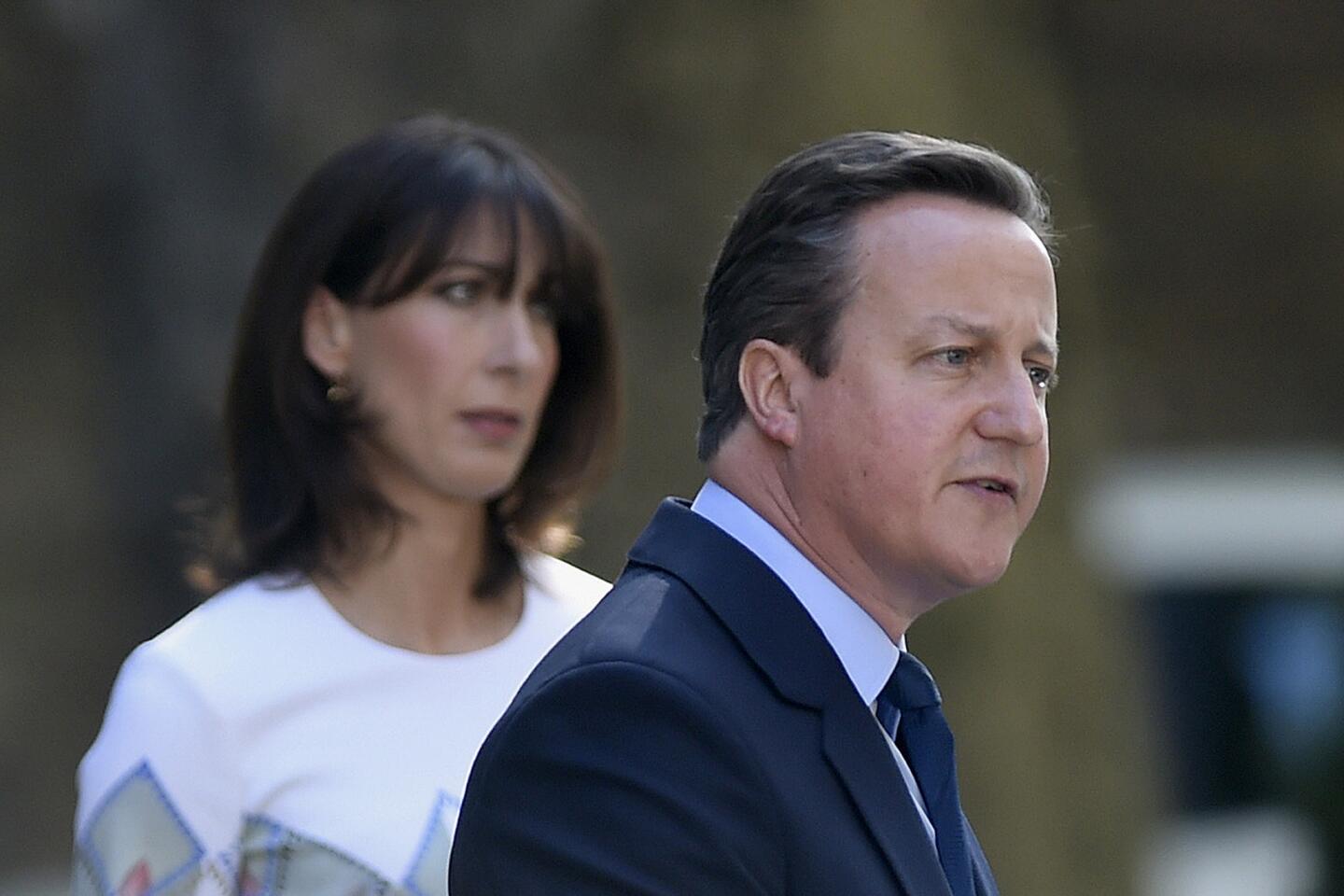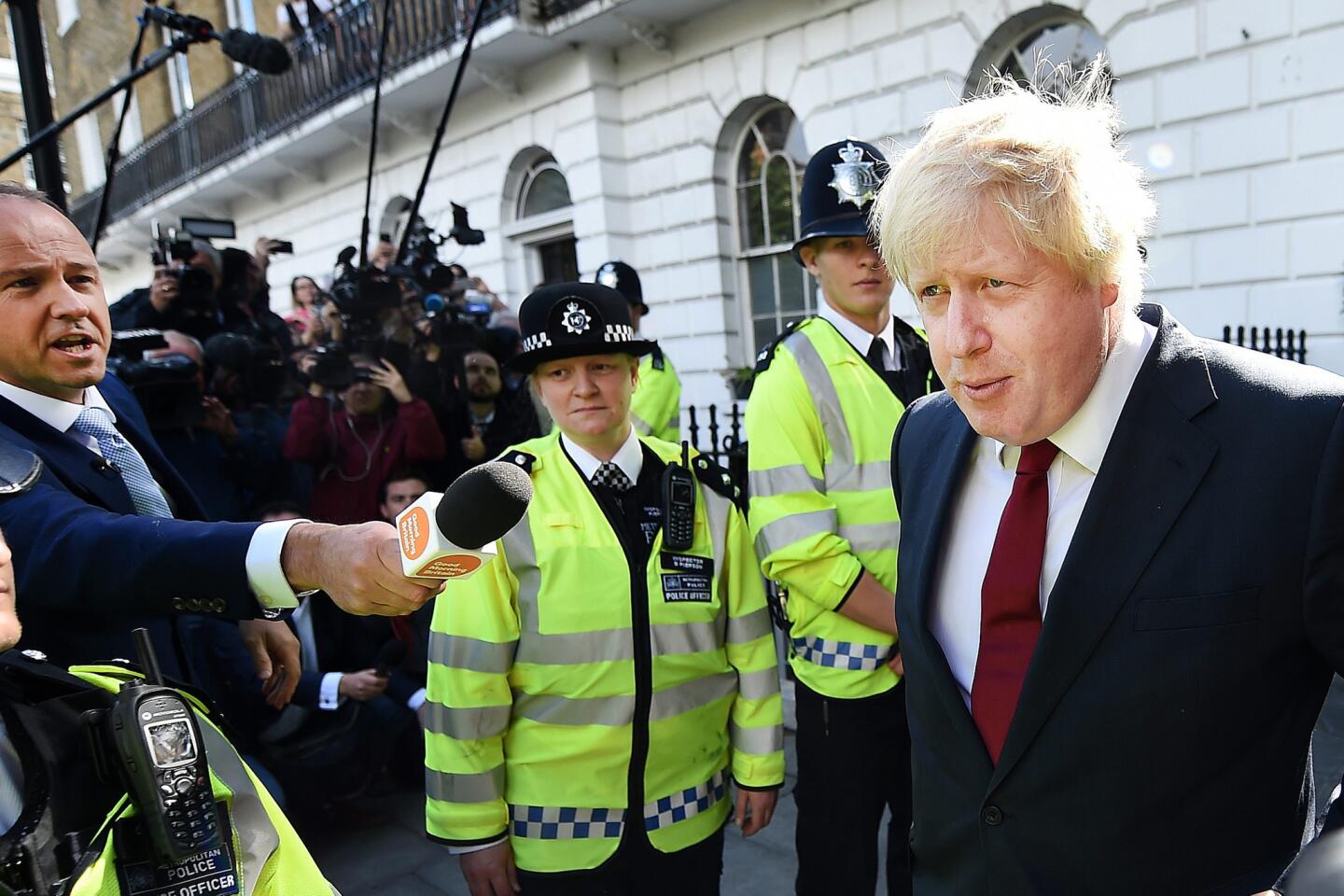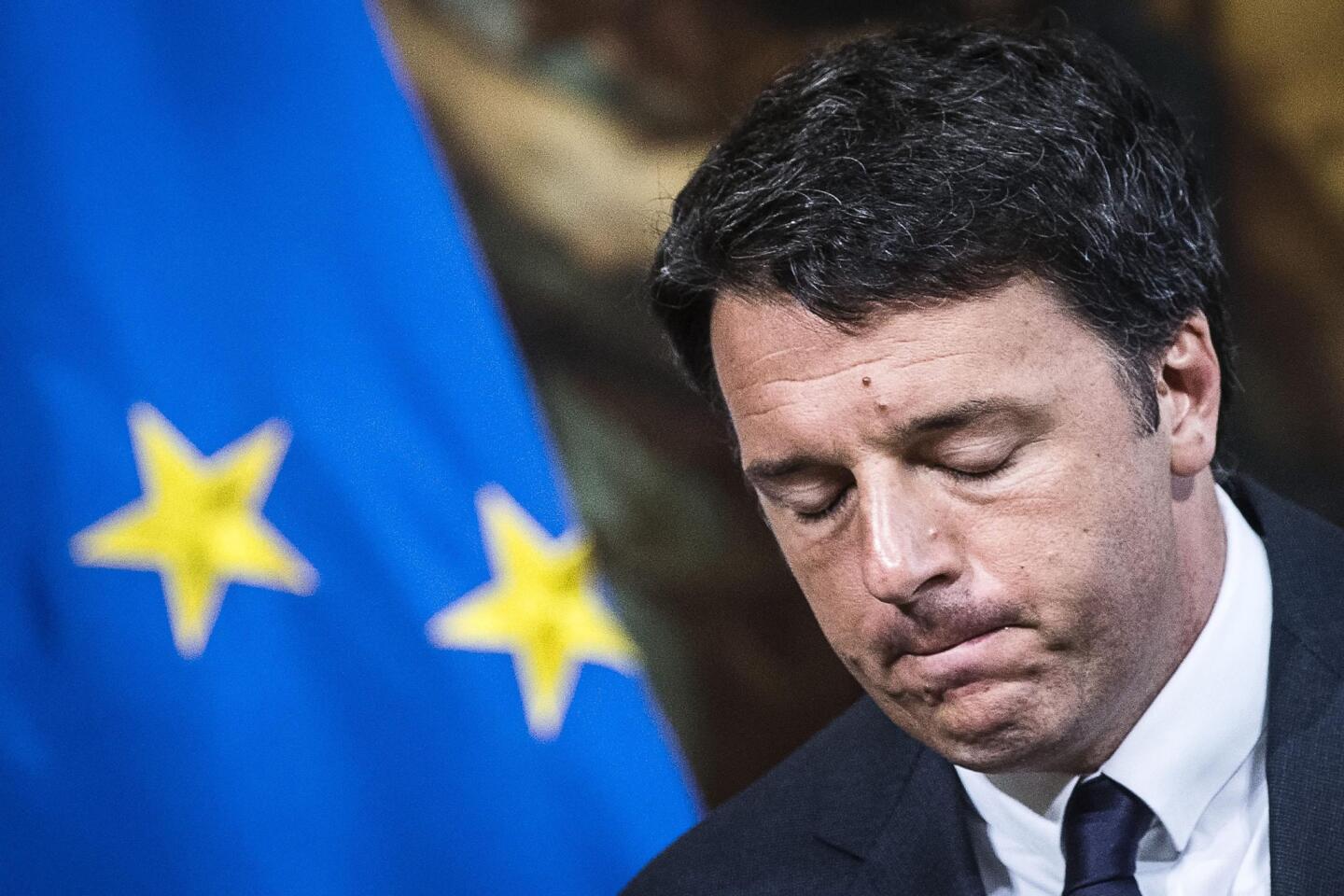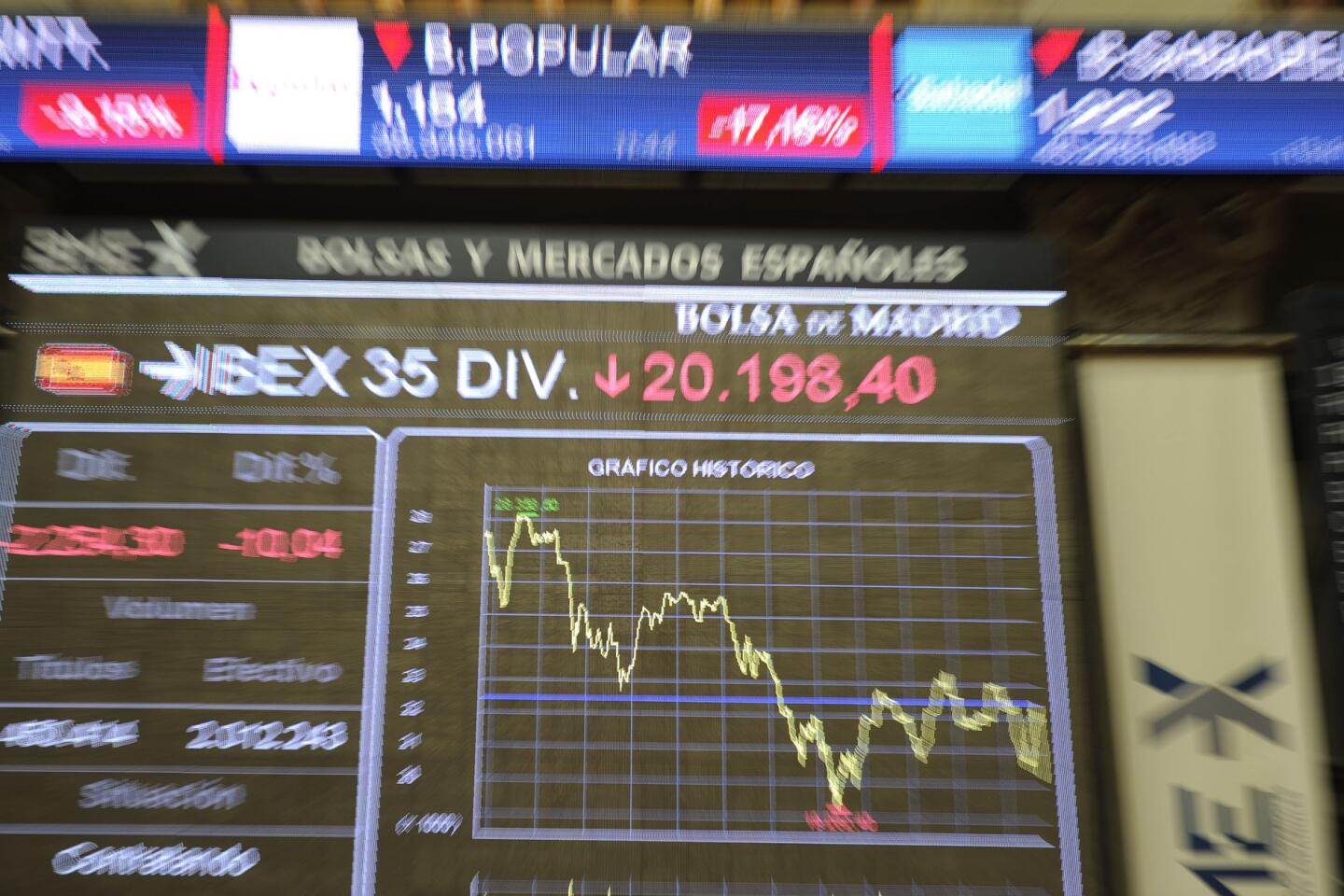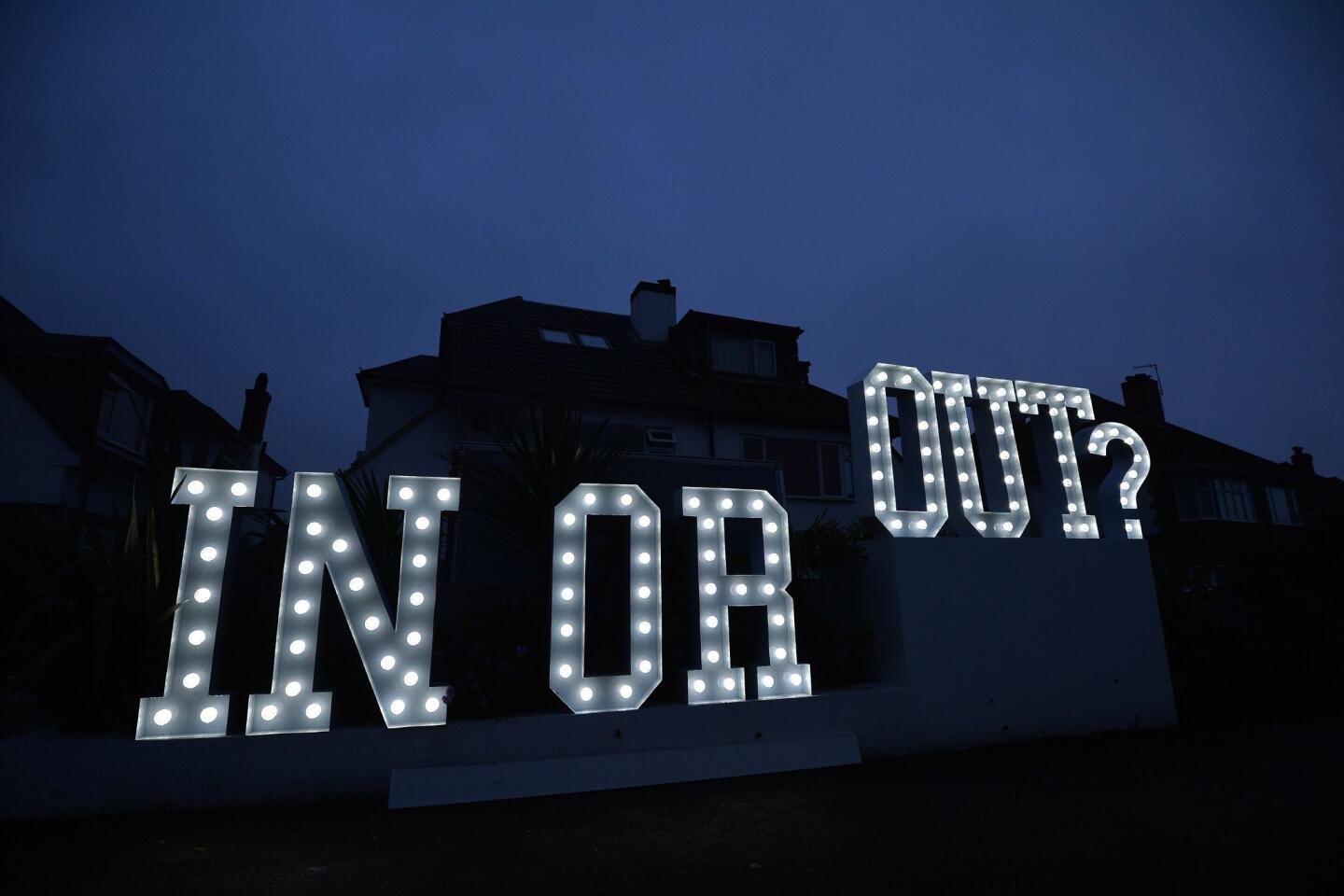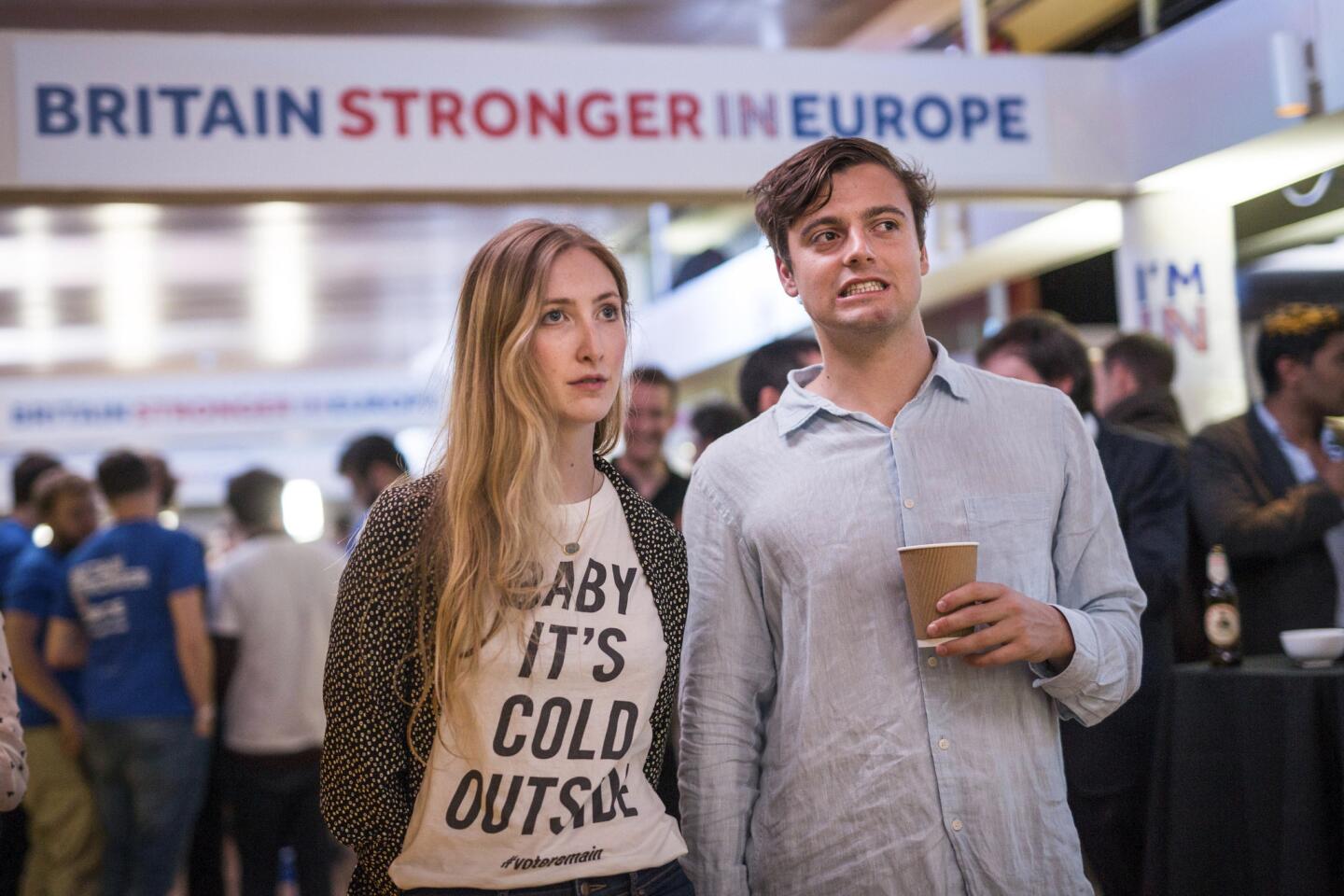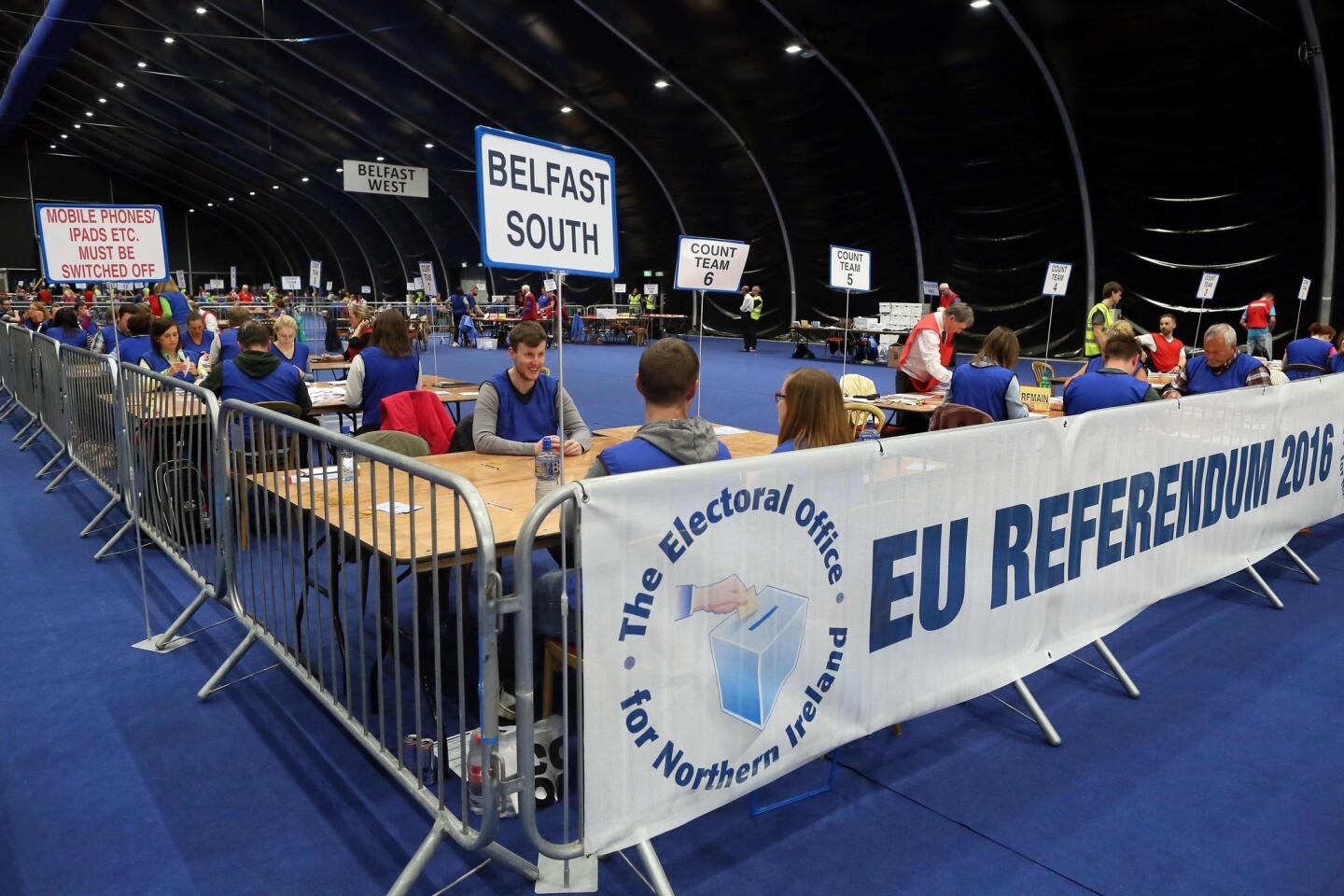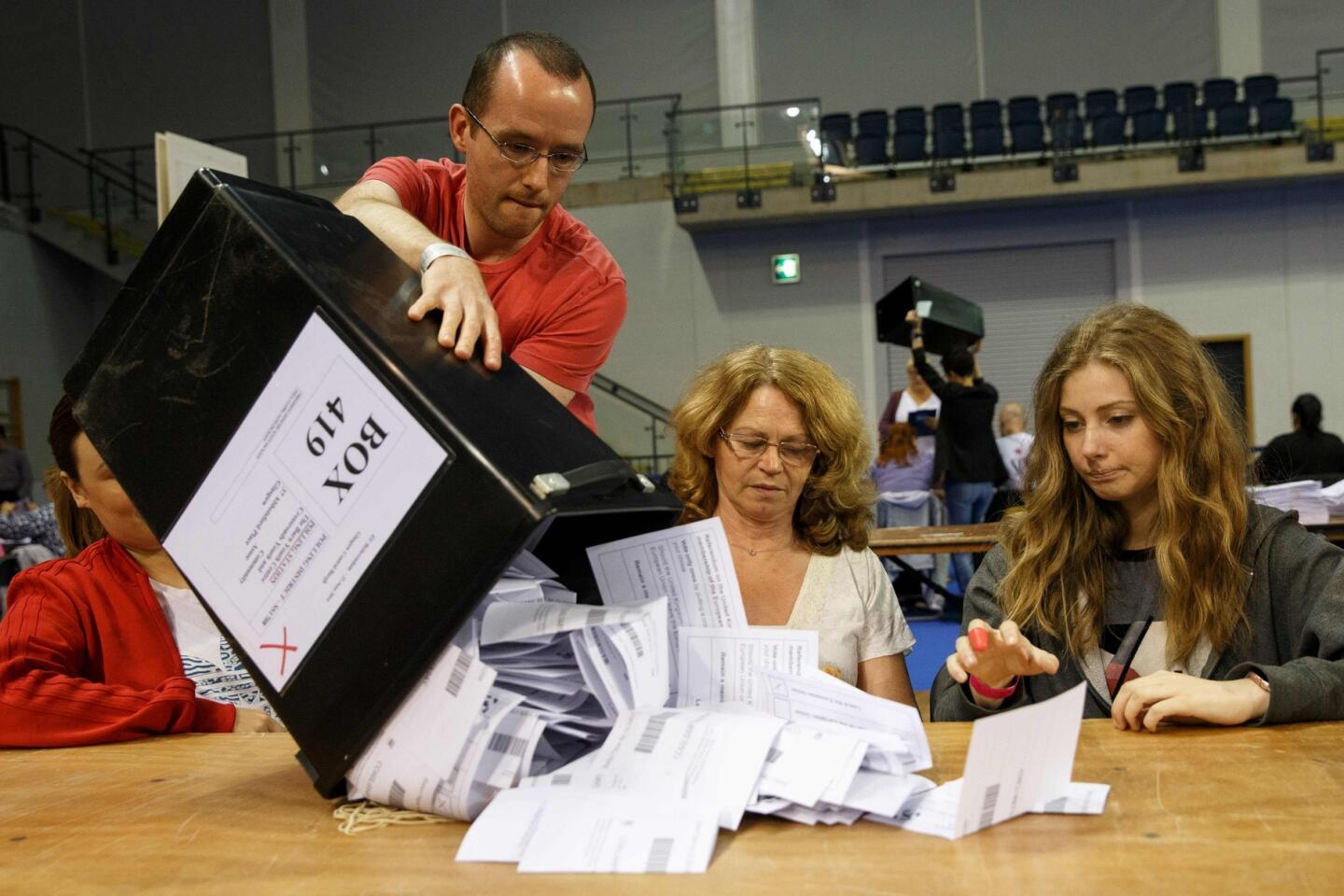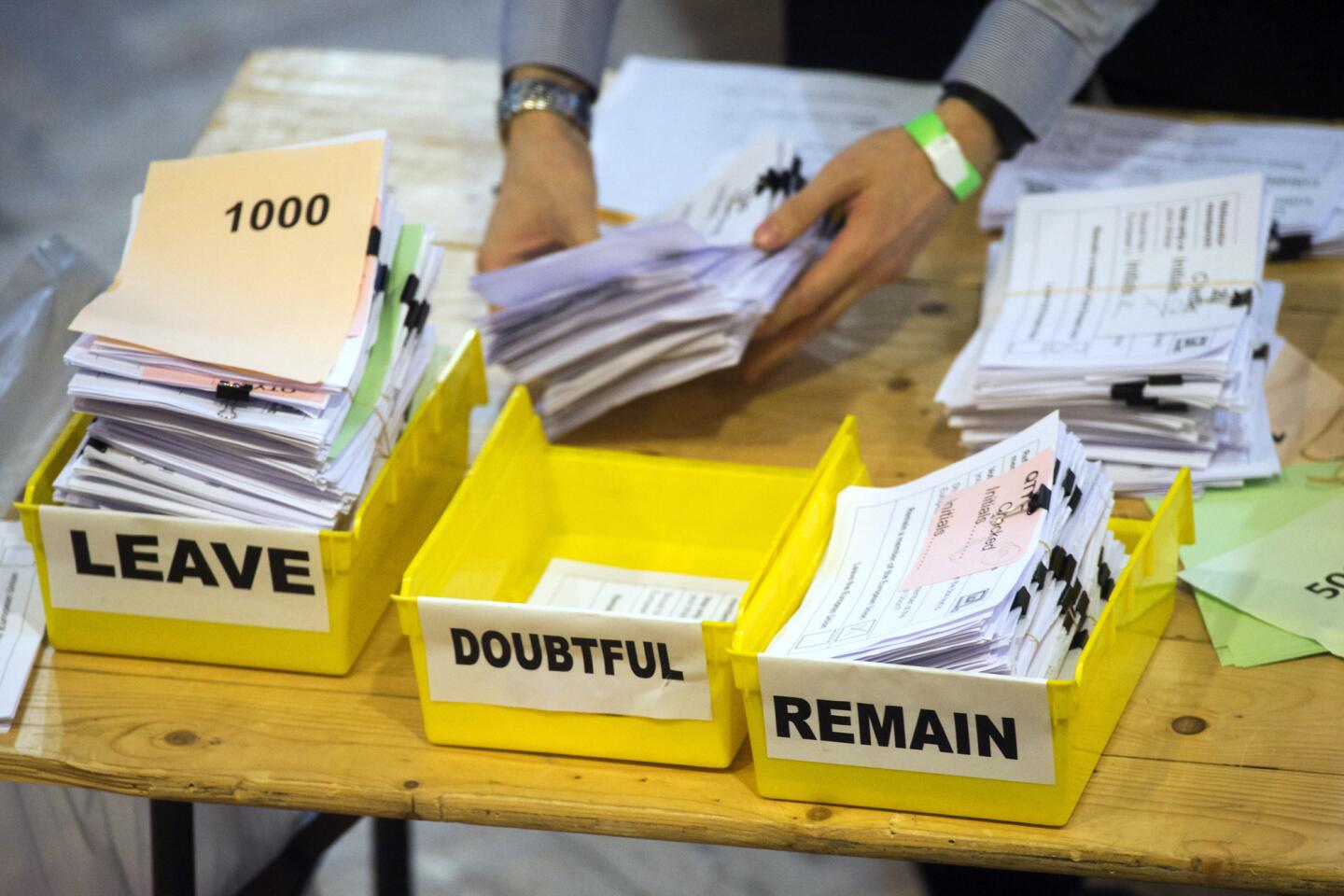‘Brexit’ shock waves rock Germany and the rest of Europe
A sense of panic and disbelief rippled through Germany and across Europe early Friday after Britain voted to leave the European Union, a stunning decision that appeared to defy economic reason and cast doubts over the future of the bloc that in various forms has been a bulwark for peace and prosperity for the last six decades.
The looming exit of the EU’s second-largest economy and most ardent advocate of free trade caught European leaders and global financial markets off guard as many evidently wrongly expected Britain to vote to stay in the trade bloc. More than $100 billion of assets was quickly wiped out in financial markets and the pound fell to a 31-year low, plunging more than 10%, as one of Europe’s most powerful countries set off on an uncharted course that will leave the EU damaged and diminished.
Updates: Britain votes to leave European Union »
“There is no way of predicting the consequences of this event, especially for the U.K.,” Donald Tusk, a former Polish prime minister and the president of the European Council that leads the 28-member EU, said in a speech in Brussels. “It’s a historic moment but not a moment for hysterical reactions. We are determined to keep our unity as 27.”
Worries that “Brexit,” as it is also known, could lead to a wider unraveling of the EU spread after Britain’s 51.9%-to-48.1% decision to leave. Opinion polls in other EU countries, such as the Netherlands and Denmark, also show majorities in favor of leaving. Ominously, the British vote galvanized far-right and anti-EU movements in France and Germany, the EU’s last two remaining powers, which will have tricky national elections in 2017 due to the rise in anti-establishment sentiment.

Britons voted Thursday to leave the 28-nation European Union, a historic vote that sent shock waves across the continent.
The same sort of contagion from the 2008 banking, sovereign debt and eurozone crises that spread across the EU, crippling economic growth and sending unemployment rates soaring, could now erode some of the political cohesion and confidence of the world’s largest free-trade bloc, with 508 million residents, analysts said.
“This is an historic breaking point and the shock waves are simply too enormous to fully gauge at this point,” said Paul Nolte, a political scientist at Berlin’s Free University. “It’s difficult to say today what the consequences for the EU are because of the centrifugal forces coming out of this vote. It will certainly give the populist forces across Europe an enormous lift. There’s tension about contagion in some of the smaller EU countries, but Europe, as a whole, has been through crises before and been able to pull things together again.”
Britain’s vote to leave, which seemed destined to plunge the world’s fifth-largest economy into a period of prolonged uncertainty that was exacerbated as Prime Minister David Cameron announced he would be stepping down, could lead to a dissolution of Britain itself, with Scotland and perhaps even Northern Ireland leaving to stay in the EU. The strong pro-EU “remain” vote in Scotland and Northern Ireland, which shares a historically fragile border with EU member Ireland, could not overcome the heavy “leave” vote in England (minus central London) and Wales.
Sinn Fein, a party supporting the union of Ireland and Northern Ireland, immediately called for a referendum after the Brexit vote while Scottish leaders also did not miss a beat in declaring their interest in leaving Britain to stay in the EU. It also triggered calls in Scotland for a second referendum for independence after voters narrowly decided to stay in Britain in 2014.
“It is a statement of the obvious that the option of a second referendum must be on the table and it is on the table,” said Scottish First Minister Nicola Sturgeon, adding it was “democratically unacceptable” for Scotland to be dragged out of the EU against its will.
“Scotland will seek independence now,” J.K. Rowlings, the Scottish author of the “Harry Potter” books, said on Twitter. “Cameron’s legacy will be breaking up two unions. Neither needed to happen.”
Also, Spanish Foreign Minister Jose Manuel Garcia Margallo reignited a 300-year-old fight with Britain on Friday by saying that Gibraltar, a 2.5-square-mile piece of British territory on the southern tip of Spain with 30,000 residents, should be returned to Spain. “The Spanish flag is now much closer to flying over Gibraltar,” he told Spanish radio.
In the Netherlands, anti-immigration leader Geert Wilders, who is seeking to become the country’s next prime minister, called for a referendum on his country’s EU membership “as quickly as possible”. Wilders, who is leading opinion polls ahead of next March’s general election, vowed that if he is elected prime minister he would ask Dutch voters if they want to stay in the EU. One opinion poll last week showed 54% in favor of “Nexit,” or the Netherlands leaving the union.
“We want to be in charge of our own country, our own money, our own borders and our own immigration policy,” Wilders said.
The leaders of Germany and France, the EU’s two most important countries along with Britain, reacted to the vote with shocked silence at first. German Chancellor Angela Merkel and French President Francois Hollande, who had previously warned of “extremely serious consequences” of a Brexit, later announced plans to hold an emergency meeting in Berlin on Monday, along with Italy’s Prime Minister Matteo Renzo
“There’s no way to put a positive spin on this -- today is a setback for Europe,” Merkel said in Berlin, urging the continent to remain “prudent” and analyze the situation calmly. “The EU is strong enough to find the right answers,” she said.
Hollande tried to keep a stiff upper lip by saying in Paris that reforms are needed in the EU to move it forward: “Europe is a grand idea, not only a market.”
One of Hollande’s rivals in next year’s presidential election, the far-right National Front leader Marine Le Pen, proclaimed the British vote a “victory for freedom.” The leader of Germany’s far-right anti-immigrant Alternative for Germany party, Frauke Petry, predicted “more countries could be voting to leave” if the EU doesn’t radically change its ways and return more power to the people in member countries.
German Foreign Minister Frank-Walter Steinmeier said it was “a sad day for Europe and Great Britain.” He added: “The news from Great Britain is truly sobering.” Germans Vice Chancellor Sigmar Gabriel wrote on Twitter: “Damn! A bad day for Europe.”
In Germany, there have been fears that the loss of its most important free-market and pro-markets ally could leave it perilously isolated on a continent with a strong socialist streak that, without Britain, would probably want even more extensive social welfare policies, protectionism and a greater distribution of wealth with even higher taxes and more state spending and intervention.
“It’s a shot across the bow, but it’s not going to be the end of Europe,” Gabriel said. “We can’t raise the drawbridges now,” he added, noting the positive signal that younger Britons had overwhelmingly voted to stay in the EU. Another leader in Gabriel’s Social Democrat party said he would welcome Scotland’s independence and EU membership. “The Scots have made it clear that they see their future in Europe,” said Thomas Oppermann, the party’s leader in parliament. “I’d welcome Scotland joining the EU.”
Germans, and others in the EU, are also worried that the departure of Britain could upset what has been a delicate balance of power and force Germany into more of an unwanted and undesired leadership role -- which in turn could lead to fears in France and elsewhere of being dominated from Berlin on a continent where the ghosts of World War II are never far away.
The EU, which was created as mainly an economic and trade union by a small group of nations clustered around France and the former West Germany as bastion for peace between erstwhile battlefield enemies, has turned into more powerful and political body as its size spread across the continent. It is often a favorite target of wrath by politicians across Europe when something goes wrong, and rarely gets any credit for successes.
The EU especially has been reeling from its inability to fully overcome waves of crises in recent years, including the financial crisis in 2008, the eurozone crisis and the refugee crises, in which more than 1 million asylum-seekers fleeing war and famine flooded into the EU last year. Criticism of the EU in Britain has focused on one of its key tenets -- the freedom of its citizens to live anywhere in the EU.
Germany’s Martin Schulz, a leader of the European Union’s parliament, said after the British vote that there were genuine fears of contagion. “I think it will not lead to the breakup of the EU if we take seriously the enormous social gap between countries and societies, we need a better distribution of wealth.”
ALSO
Op-Ed: The isolationist catastrophe of ‘Brexit’
U.S. markets drop sharply after ‘Brexit’ vote increases global recession risk
More to Read
Start your day right
Sign up for Essential California for news, features and recommendations from the L.A. Times and beyond in your inbox six days a week.
You may occasionally receive promotional content from the Los Angeles Times.
